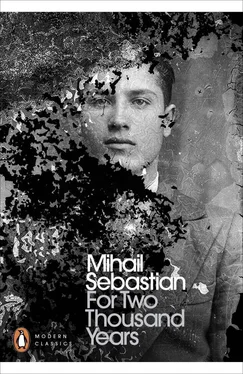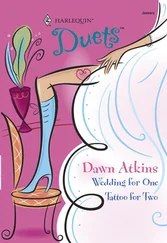I don’t know what he said. I tried several times to shake free from drowning in the sea of people beneath his waves of words, some whispered, some shouted. I looked for a single island amid the shipwreck, to stem for a moment the insistent thundering flow of questions, to retain a thought, a judgement, a direction. It all seemed overwhelming, urgent, unstoppable, like an earthquake. I could no longer recognize the person who was speaking. He was glimpsed from afar, an unsettling apparition from a dream, something out of a legend.
I was brought back to the moment by the cheering and shouting and the thunder of applause. A familiar song arose from the galleries:
The foreigners and the Yids
All suck us dry, always suck us dry.
Obviously.
*
A moment of crisis, a moment of crisis … A world that’s dying, a world being born … History split into two parts … a dead epoch … a living epoch …
Don’t be afraid, dear old gentlemen. You have nothing to lose. Neither what you’ve been believing, nor your head, nor your money, nor your little certainties, nor your little doubts. Everything will remain in place, everything will stay as it was. As it happens, there is a cry that arises again on time to calm the fever of indignation and to take the sting out of great revolutions. There is another death, which can be demanded more easily than your own precious death. There is a race of people ready to pay up on time for you. To pay for the overfed, for the starved, for the white, for the red, for the thin, for the fat. Haven’t you always said they’re a race of bankers? So, let them pay.
*
No, no, no, a thousand times no. I mustn’t reproduce my 1923 notebook all over again. If I don’t immediately choke my taste for martyrdom, I’m lost.
I know: it’s incomparably easier to accumulate disappointments and to live on their embers, to immerse myself in stagnant pools and the warm waters of sadness, and to believe in the pride of that sadness — it’s much easier than remaining on guard, and being comprehending of others and harsh with myself. I will keep watch, even if I am keeping watch over my final hour.
(‘Keeping watch over my final hour’ is still too rhetorical. Almost a slogan. My dear friend, there are enough sloganeers. If you can’t manage to speak, keep quiet.)
*
I asked Pârlea:
‘Aren’t you afraid it’s going to end again with cracked skulls and broken windows? Don’t you ask yourself if it’s going to end up with an anti-Semitic disturbance, and go no further? Don’t you think calling this thing of yours a “revolution” is just using a new word for an ancient wretchedness?’
He frowned, and answered:
‘There’s a drought, and I await the rain. And you stand there and tell me: “A hard rain is what we need. But what if it comes with hail? If it comes with a storm? If it ruins what I’ve sowed?” Well, I’ll tell you: I don’t know how the rain will fall. I just want it to come. That’s all. With hail, storm, lightning, as long as it comes. One or two will survive the deluge. Nobody will survive drought. If the revolution demands a pogrom, then give it a pogrom. It’s not for me, or you, or him. It’s for everybody. Whose time is up and whose isn’t, I don’t care, even if I myself die. I only care about one thing: that there’s a drought and rain is needed. Apart from that, I want nothing, expect nothing, wonder about nothing.’
I could reply. I could tell him that a metaphor is inadequate in the face of a bloodbath. That a Platonic inclination for dying doesn’t balance out the serious decision to kill. That through the ages there has never been a great historical infamy committed for which there couldn’t be found a symbol just as big, to justify it. That, in consequence, we would do well to pay attention to great certainties, to great invocations, to the great ‘droughts’ and ‘rains’. That the temper of our most violent outbursts might benefit from a shade less enthusiasm.
I could reply. But what good would it do? I have a simple, resigned, inexplicable sensation that everything that is happening is in the normal order of things and that I am awaiting a season that will come and pass — because it has come and passed before.
*
‘Your presence is harmful,’ Pârlea tells me. ‘You’re too lucid. We need a generation of men who have had enough of always being intelligent. A small band of men capable of throwing caution to the wind.’
Pârlea isn’t joking. Like any missionary, he can’t stand those who wait and watch. Several times he’s hit me with: ‘Answer, man, black or white? Yes or no?’ The intolerance of the inspired is dreadful. I used to believe it was a Jewish defect, but I was wrong: the defect arises from fervour. S.T. Haim, at one time, criticized me for exactly the same thing as Ştefan Pârlea today: a deliberate lack of enthusiasm. Were I to tell him I have my own demons, he wouldn’t believe me. The only difference between us is that he lets his excite his fever while I keep watch over mine.
I’ll always resist invitations to fervour, and will resist the more tempting ones all the more resolutely. Letting yourself be swept along on the current is too attractive to be trusted.
It has been my fortune to have grown up by the Danube, where the humblest boatman working the oar must continually read the waters. I don’t know any inspired boatmen, only those who take care. All your nebulous intuitions are worthless on the Danube. What you need is good judgement.
Were I less wary of over-analysing myself, I’d try to establish to what degree I’m above all a native of the banks of the Danube. That is my country. It has always been hard for me to simply say those two words — ‘my country’. Since childhood I’ve become accustomed to having my good faith doubted. Sensitive to ridicule, I haven’t insisted on making affirmations that nobody would accept.
We, Romanians … It was almost inevitable at school, in history lessons, recounting a war, to employ this first person plural: we, Romanians (‘which Romanians?’ someone on my bench shouted at me once, forbidding me for a good while from sympathizing with the story of Ştefan the Great). I was careful to avoid terms that might be judged affected, though I was at an age when solemn words provide a certain pleasure. Country, fatherland, nation, hero — a whole forbidden vocabulary. As an intellectual exercise, it wasn’t bad, as I was forced from early on to monitor my words and to make them mean exactly what was required. But, no matter how much consolation you get from the feeling of being wronged, the game isn’t all fun. A shadow of terror hangs over all my memories of school and childhood.
Today I regard with asperity any tendency I have towards feeling persecuted and I’m rather unforgiving of my emotional outbursts. But I will not soon forget my first night on guard duty years ago, in the regiment, when they told me that position number 3, in the adjutancy, could not be assigned to me. (‘There’s a special regime for Jews,’ explained the lieutenant, a little embarrassed.) In this way, as far as they were concerned, even if I wasn’t a proven traitor, I was in any case a potential one. A ‘special’ regime annulled in that moment the life I had lived on this soil, the lives of my parents, the lives of my grandparents and great-grandparents, a ‘special’ regime with a serial number erased nearly two centuries of history in a country which, of course, was not ‘my fatherland’, since I might betray it in the course of a night on guard duty.
Writing, I have the feeling that I’m getting pathetic about ‘my sad fate’, and this is not my intention at all. It’s good to remind myself anew that I decided once and for all not to be a martyr, which is too serious a role for me to play. All I am doing here is explaining to myself my plain inaptitude for certain grand words, certain solemn ideas. Probably it will always be difficult for me to speak of ‘my Romanian fatherland’ without a feeling of sudden awkwardness, being unable to conquer through willpower a right which the slow passage of time has not let me conquer, in the face of good faith ignored and sincerity scorned. But I will speak of a land that is mine, and for her I will risk appearing ridiculous, and I will love that which I am not allowed to love. I will speak of the Bărăgan and the Danube as belonging to me not in a legal or abstract sense, under constitutions, treaties and laws, but bodily, through memory, through joys and sorrows. I will speak of the spirit of this place, of its particular genius, of the lucidity I have distinguished here under the white light of the sun on the plain and the melancholy I perceive in the landscape of the Danube, drowsing to the right of the town, in the watery marshes.
Читать дальше












